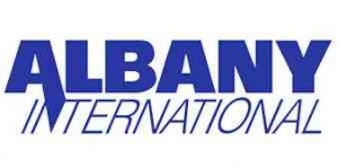
Albany International Corp. (NYSE:AIN), a market leader in the global machine clothing industry with a new growth driver in aerospace engineered composite components, may be the answer, combining the best of both worlds of stability and growth. Unfortunately, the market has recognized that, valuing Albany International Corp. (NYSE:AIN) at a hefty 18 times forward P/E and 2.1 times PEG. Investors will be well advised to wait for a better time (and price) to buy.
Is machine clothing a cash cow?
There are two key characteristics of a cash cow business: high market share and strong cash flow generation. Albany International’s paper machine clothing business, which manufactures specialized fabric covering the rollers of paper machines, meets both criteria.
Firstly, Albany International is the global market leader in machine clothing with 30% market share, according to its most recent 10-K.There are debates over whether high market share confirms the existence of a competitive advantage, or is a competitive advantage by itself. In my opinion, relative market share matters. Its largest competitor is Xerium Technologies, with only 15% market share, half that of Albany International. Albany International Corp. (NYSE:AIN) is able to charge a price premium for its products relative to its competitors, evidenced by a higher gross margin of 40% for fiscal 2012 compared with 36% for Xerium Technologies.
Secondly, Albany International has a proven cash flow generation track record, having delivered positive operating cash flow for every single year in the past decade. It also has an unbroken streak of dividend payments since 2002, with quarterly dividends per share increasing by 180% on an absolute basis from 2002 to 2013. Another quantitative indicator of a cash cow is the capex-to-sales ratio. Albany International Corp. (NYSE:AIN)’s capex-to-sales ratio has remained under 5% for the past four years. Its capital expenditures have not exceeded depreciation, indicating that they are low maintenance in nature, in line with the reasoning that cash cows do not have to invest much for growth.
Why is this business segment a star in the making?
Albany International Corp. (NYSE:AIN)’s aerospace engineered composite components business segment currently accounts for about 10% of its total revenue, but exhibits tremendous growth potential. Management has plans to grow sales from this segment from $67 million in 2012 to $300-$500 million by 2020, according to its most recent earnings conference call.
This business segment manufactures fan module components for the new LEAP engine for single aisle aircraft. Similar to how eco-ships have taken the shipping industry by storm with their touted fuel savings, this LEAP aircraft engine, produced by CFM International, delivers a 15% improvement in fuel savings vis-à-vis the older CFM56-7B model. It is intuitive that a lighter plane will require less fuel — Albany’s International’s engineered composite components contribute to a reduction of as much as 1,000 pounds in aircraft weight.
In addition to exclusive contracts with The Boeing Company (NYSE:BA) and the Commercial Aircraft Corporation of China, airlines across the world such as Qantas, AirAsia, and Southwest have already ordered LEAP engines, according to information by General Electric Company (NYSE:GE).
Peer comparison
There are no direct competitors with Albany International Corp. (NYSE:AIN)’s machine clothing segment with a meaningful market capitalization above $200 million. I included peers with aerospace exposure, B/E Aerospace Inc (NASDAQ:BEAV) and LMI Aerospace, Inc. (NASDAQ:LMIA) for comparison purposes.
B/E Aerospace is the world leader in aerospace fasteners and consumables distribution and aircraft cabin interior products manufacturing. B/E Aerospace Inc (NASDAQ:BEAV) does not benefit equally from growth in every single type of aircraft; increased wide-body aircraft deliveries will be much more positive as they drive refurbishment and retrofitting opportunities. Given the fragility of airlines, it will be comforting for investors to know that B/E Aerospace Inc (NASDAQ:BEAV) has a diversified revenue base, with The Boeing Company (NYSE:BA) and Airbus accounting for less than one-fifth of revenue.
LMI Aerospace, Inc. (NASDAQ:LMIA) is a supplier of structural assemblies, kits, and components to aerospace companies. On one hand, it is a beneficiary of an increase in outsourcing by aircraft manufacturers; on the other hand, it faces competition from foreign aerospace manufacturers with lower labor costs. LMI Aerospace, Inc. (NASDAQ:LMIA)’s top six customers, including Boeing, represented more than three-quarters of its fiscal 2012 revenue. This customer concentration risk is partly mitigated by the fact that its customers value its services — LMI Aerospace was recently awarded by The Boeing Company (NYSE:BA) with the “Supplier of the Year” Award.
Conclusion
Investing is all about profiting from varying perceptions. In this case, the ‘quality’ of Albany International Corp. (NYSE:AIN) has been factored into the stock price, which is close to its five year high. Patience is the most important virtue for investors when they come across good companies at unattractive prices.
The article Should You Buy This Stock That Combines Stability and Growth? originally appeared on Fool.com and is written by Mark Lin.
Mark Lin has no position in any stocks mentioned. The Motley Fool has no position in any of the stocks mentioned. Mark is a member of The Motley Fool Blog Network — entries represent the personal opinion of the blogger and are not formally edited.
Copyright © 1995 – 2013 The Motley Fool, LLC. All rights reserved. The Motley Fool has a disclosure policy.


